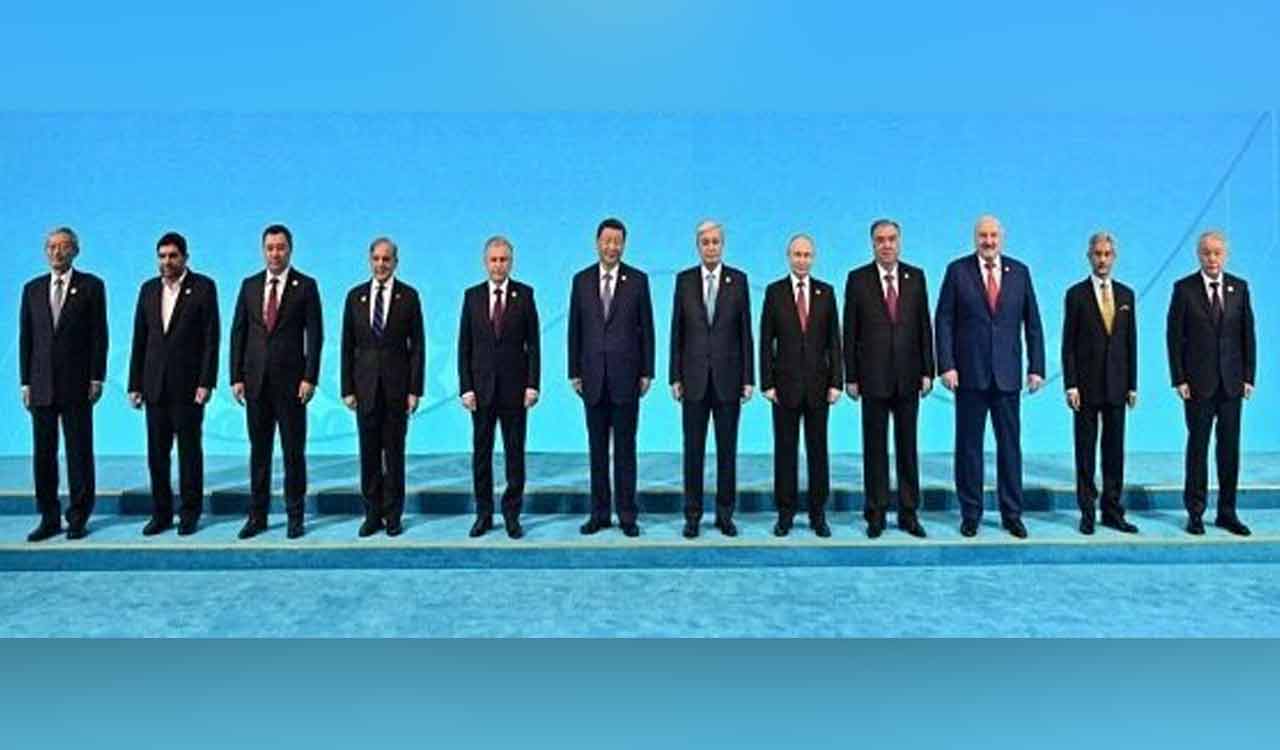Opinion: India’s strategic interests, geopolitical calculations at SCO meet
Due to geopolitical tensions, geo-economic forces and geo-technological advancements, it makes more sense to be part of the principle-based trans-regional international organisation than outside it

By Shiv Bhagwan Saharan
On July 3-4, the 24th meeting of the Shanghai Cooperation Organisation (SCO) Council of Heads of State was chaired by Astana, Kazakhstan, in the backdrop of ongoing conflicts — the Gaza war and the Russian invasion of Ukraine, trust deficits and rising tensions around the world. The Indian delegation, with Modi’s vision of ‘SECURE’ — which stands for Security, Economic development, Connectivity, Unity, Respect for sovereignty and territorial integrity, and Environmental protection — was led by External Affairs Minister (EAM) Dr S Jaishankar. Prime Minister Narendra Modi skipped the meeting due to the ongoing first session of the Indian Parliament, as stated officially.
However, experts are unconvincing of this reason, speculating that PM Modi is closer to the United States, even as New Delhi’s engagement in the SCO is seen as a symbol of its strategic autonomy. India’s also multi-aligned policy under Modi’s leadership, in which New Delhi is part of the Quad as well as an engaging member State of the SCO, which is largely dominated by China and Russia, works against the United States’ interests in the Indo-Pacific region. Therefore, the United States might have pressured PM Modi to skip the SCO meeting. However, he later visited Russia and Austria from July 8-10.
Evolution of SCO
The Shanghai Cooperation Organisation (SCO) was known as the Shanghai Five, a security group founded mainly by China and Russia to counter Western domination of the Indian Ocean and East Asia in 1996. The SCO comprises China, Russia and four Central Asian nations Kazakhstan, Tajikistan, Kyrgyzstan and Uzbekistan. It was formed after signing the treaty on Deepening Military Trust in Border Regions in Shanghai.
Later, in 2001, when Uzbekistan joined, the SCO emerged as the largest trans-regional organisation in Eurasia. India and Pakistan joined the SCO at the Astana summit in 2017, and Iran joined as a full member-State in 2023, hosted virtually by India. Belarus will be the 10th nation to join as a member of the SCO in 2024, while Turkmenistan is not a member but remains a permanent invitee.
The SCO also has several observer States, such as Afghanistan and Mongolia, and dialogue partners Armenia, Azerbaijan, Sri Lanka and Nepal. It covers one-quarter of the Earth’s surface and over 40 per cent of the world’s population, contributing one-third of the world Gross Domestic Product (GDP).
Goals and Organisational Structure of SCO
The main goals of the SCO’s principle-based regional organisation are to maintain regional peace and security, counter-terrorism, separatism, drug trafficking, climate change and extremism, and to promote political and economic development by establishing relations with the United Nations, ASEAN, CSTO and others. The SCO is governed by the Heads of State Council, which meets once a year as the supreme decision-making body. The Tashkent (Uzbekistan)-based Regional Anti-Terrorist Structure (RATS), an integral part of the SCO, combats terrorism, separatism and extremism, which was formed on June 7, 2002.
Jaishankar delivers remarks on Modi’s behalf
In 2024, on behalf of PM Modi, External Affairs Minister (EAM) Dr S Jaishankar delivered India’s statement at the 24th meeting of the SCO Council of Heads of States. “The 21st century is the century of technology. It’s essential to harness this technology creatively and use it to benefit and advance our societies. India is one of the nations that has developed a National Strategy on Artificial Intelligence and launched an AI Mission. Our dedication to ‘AI for All’ is also evident in our collaboration within the SCO framework on a Roadmap for AI cooperation,” he said.
Notably, in most declarations, the member-States present a united front, reaffirming that “the SCO is not directed against other States” and committing to “a policy that excludes bloc, ideological and confrontational approaches” to address trans-regional issues. The members emphasised that “the principles of mutual respect for sovereignty, independence, territorial integrity of States, equality, mutual benefit, non-interference in internal affairs and non-use of force or threats of force are the foundation of sustainable international relations”. They also reiterated their “strong commitment to combating terrorism, separatism and extremism”.
In 2022, PM Modi emphasised that, “This is not an era of war,” referring to the ongoing Russian invasion of Ukraine. Moreover, New Delhi always looks to secure its national interests at the summit, focusing on combating terrorism, mainly ‘cross-border terrorism’, where India accuses Pakistan-based terrorist organisations of being sponsored by Pakistan. Meanwhile, India and China have faced a three-year border standoff in the Eastern Ladakh region.
Strategic Importance
India has a strategic interest in participating in the SCO to maintain historical ties with Russia and addressing diplomatic disputes with China and Pakistan. It is an important platform for New Delhi to raise serious issues such as terrorism, border disputes, climate change, economic growth, development, cyber-security and others.
In the SCO meetings, New Delhi also stressed the strategic importance of respecting territorial integrity and sovereignty. Therefore, due to geopolitical and strategic calculations, I think, PM Modi will participate in the next SCO summit, which will be hosted by China in 2025.
The complexities of the SCO require deft diplomacy, anchored in pragmatism, to explore areas of overlapping convergences in this multilateral setup. Despite challenges, the SCO remains a key vector in India’s Eurasian calculus. Further, the potential of the SCO remains untapped, including assistance on humanitarian grounds, disaster relief, terrorism, health and climate change — an issue affecting the majority of SCO nations.
Even so, due to geopolitical tensions, geo-economic forces and geo-technological advancements, it makes more sense to be part of this trans-regional international organisation than outside it. Also, New Delhi wants to expand interaction with the Central Asian Nations and influence regional security policies, along with sharing civilisational relations with nations in the region.
“The SCO also provides us with a unique platform to unite people, collaborate, grow and prosper together, practising the millennia-old principle of Vasudhaiva Kutumbakam, which means The World is One Family,” said Jaishankar.

(The author is a Senior Research Fellow (SRF) and Doctoral Fellow at the School of International Studies (SIS), Jawaharlal Nehru University, New Delhi. He tweets at @ShivBhagwan_JNU)
Related News
-
Bangladesh plans to invite Modi, Tarique Rahman to take oath on February 17
-
Revanth Reddy targets Modi, drags conjoined twins Veena-Vani into abusive speech
-
Jaishankar, Rubio welcome trade deal; discuss energy, nuclear, defence, critical minerals
-
India categorically rejects Epstein file reference to PM Modi
-
Man murdered by wife for forcing her into prostitution in Mancherial
3 mins ago -
Burgampad police arrests two for attempting to kill their friend to claim insurance money
8 mins ago -
Married woman attacked by widower in Mahabubabad with petrol
11 mins ago -
Medak District Collector sentenced to six months in jail
18 mins ago -
Congress, BJP unite to capture Kagaznagar chairperson, raises eyebrows of many
24 mins ago -
Vaishnaw apologises for chaos at opening day of AI summit
2 hours ago -
Chairperson polls in three municipalities deferred again as Congress unleashes anarchy
2 hours ago -
25th batch of police canines, handlers pass out at IITA Moinabad
4 hours ago




